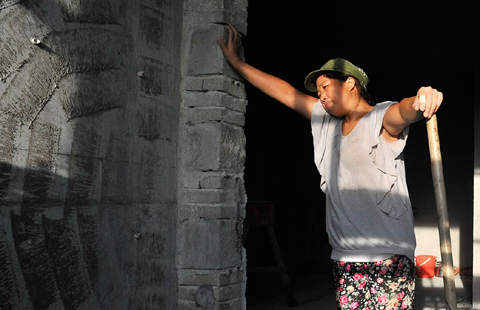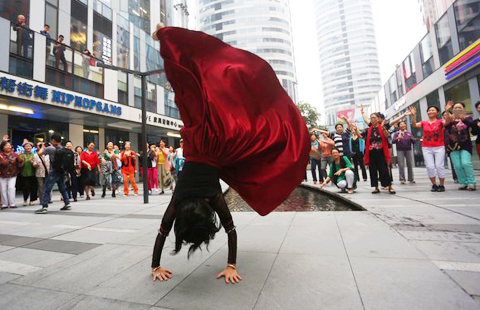Shrimp that fits for an emperor
Updated: 2014-10-10 07:51
By Zhu Weijing(China Daily Europe)
|
|||||||||||
River prawns made with Longjing tea is a famous dish from Hangzhou, Zhejiang province, and one that legend says was discovered during the Qing dynasty
The lingering fragrance of tea and the divine texture of shrimp: 龙井虾仁, a signature dish of Hangzhou cuisine, brings imperial pleasure to your dining experience.
As connoisseurs of tea, the Chinese have elaborate systems for brewing and growing it, yet, for Chinese tea enthusiasts, tea culture involves so much more. Besides the famous aromatic beverage, tea can also be turned into medicine and oil, and can be used in cooking. Longjing (Dragon Well) tea goes well both with a meal and in a meal.


The story of Longjing shrimp, like many other classic dishes, relates to the Qianlong Emperor (乾隆皇帝), a Qing Dynasty (1644-1911) emperor known for his obsession with the region of Jiangnan (South of the River, 江南) and food. On an excursion to the south, Qianlong passed Hangzhou, the hometown of Longjing tea, while touring the picturesque West Lake.
Disguised as a commoner, legend has it, the emperor hid from the rain in a woman's house and was offered tea made from freshly picked tea leaves boiled in spring water on a charcoal fire. Impressed by the taste but not wanting to reveal his true identity, the emperor pocketed some leaves and continued his trip. At sunset, he reached an inn and ordered several dishes, and among them was fried shrimp. When the emperor passed the leaves to the waiter to make some tea, the waiter caught a glimpse of the imperial gown underneath and rushed to inform the chef.
Horrified and under immense pressure, the chef accidentally added tea leaves into the dish, mistaking them for green onions. The luminescent pink color of the shrimp with the green leaves scattered among them, coupled with the fragrance of Longjing, won the emperor over. Thus the classic Hangzhou dish was born.
Some attach a poetic rather than imperial significance to the origin of this dish.

Many credit the inspiration of Longjing shrimp to a poem written by Su Shi (苏轼), the Song Dynasty (960-1279) poet and gastronome.
The verses have a fitting title: "Remembering South of the River" (《忆江南》), which says: "Do not reminisce over the old country with old acquaintances. Instead, build a new fire to brew new tea. To enjoy poetry and wine, take advantage of your prime." (休对故人思故国,且将新火试新茶。诗酒趁年华。) The "new tea" in the poem refers to tea made from leaves picked within the year (usually early spring), also used in Longjing shrimp. "New fire" relates to an ancient Chinese tradition called the Cold Food Festival (寒食节), which falls right before Tomb Sweeping Festival (清明节). Since fire was banned during the Cold Food Festival, fire started for cooking after the festival was called new fire. Legend has it that the poem inspired a Hangzhou chef to combine newly picked tea leaves with shrimp from the river to create the dish.
Consisting mainly of fresh shrimp, the dish is rich in amino acids.Longjing tea is said to lower the body's temperature and kill off bacteria, and the river shrimp, which are highly nutritious, can strengthen the kidneys and improve circulation.
River shrimp, or 河虾, are a type of freshwater prawn, and in the Compendium of Materia Medica (《本草纲目》) - a work of traditional Chinese medicine written by Li Shizhen during the Ming Dynasty (1369-1644) - the shrimp, when peeled and served with ginger and vinegar on the side, are praised as a "delicacy among food".
This aromatic dish was among the specialties premier Zhou Enlai had prepared for US president Richard Nixon in Hangzhou during his visit to China in 1972.
Local Hangzhou chefs at Xuxian Lou (许仙楼) are known to take about three hours to complete the dish, but for cooks at home, the process is much easier and less time-consuming. Whether it's the product of Emperor Qianlong's discovery or poetic nostalgia, Longjing shrimp has become a classic Hangzhou dish that you simply must try.
Courtesy of the World of Chinese, www.theworldofchinese.com
Recipe | Longjing Shrimp
Ingredients (3 servings)
1kg river shrimp 河虾
25g Longjing tea leaves 龙井茶叶
20g salt 盐
5g yellow rice wine 黄酒
5g cornstarch 生粉
500ml cooking oil 食用油
20g vinegar 醋
50g hot water 热水
Method:
1. Chill shrimp for 30 minutes. To peel shrimp, hold shrimp's head and tail with its belly facing away. Squeeze your index finger and thumb to force shrimp from its shell naturally. Make a pot of tea (25g of tea leaves in 50g of hot water) and let sit for 15 minutes. Pour tea into a bowl to soak peeled shrimp. Add 15g of salt, and let sit for about 20 minutes.
2. Wash soaked shrimp in running water for 20 minutes and use towels to dry. In a bowl, add 2g of salt and 5g of cornstarch mixed into a paste with water. Stir until shrimp are evenly coated.
3. Heat wok on high and pour in 500ml of cooking oil. Let oil reach 120 C. Add shrimp, stir for 10 seconds, remove.
4. Pour oil out of wok and add 3 to 4 teaspoonfuls of tea. Add salt and cornstarch, put shrimp back in wok. Flip 4 to 5 times and move shrimp to plate. Decorate with brewed tea leaves. Dip shrimp in vinegar and enjoy.
The World of Chinese
(China Daily European Weekly 10/10/2014 page27)
Today's Top News
On this beach no one is naked
Barrage of deals expected on Europe trip
First US Ebola patient dies
Sino-Portuguese relations make 'giant leap' forward
Holiday spending habits change
Book of Chinese president debuts at Frankfurt fair
China's 'Nightingale' races for Oscar
Britain to deploy 750 servicemen in West Africa to tackle Ebola
Hot Topics
Lunar probe , China growth forecasts, Emission rules get tougher, China seen through 'colored lens', International board,
Editor's Picks

|

|

|

|

|

|





